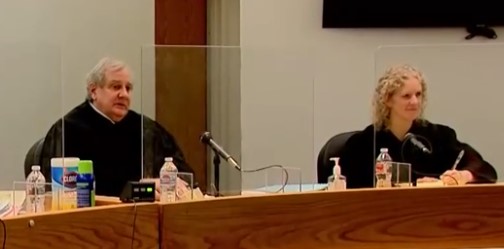
The estate of Molly Parks appeared before the Alaska Supreme Court earlier this month, seeking to overturn a lower court ruling in a civil suit against the Petersburg Borough. Parks was one of two employees killed in the wreck of a borough van in 2016. Although the driver of the van served jail time, the civil claims against the borough were dismissed in Superior Court.
The July 4th 2016 crash of a borough van claimed the lives of 18-year-old Molly Parks, 19-year-old Marie Giesbrecht, and injured another, all employees of the borough at the time.The driver, Chris Allen, suffered a seizure and lost control of the vehicle. Initially charged with murder in the second degree, Allen pleaded guilty to a reduced charge of manslaughter. He was sentenced in 2018 to jail time in the criminal case. Parks parents subsequently filed a civil suit on behalf of her estate, seeking damages against the borough, Allen, and the State of Alaska.
Attorney Mark Choate is co-counsel for plaintiffs. In oral arguments before the court he pointed out that the local government knew about the seizures Allen suffered after seeing him experience one on a surveillance video while he worked at Parks and Recreation.
“The city people supervising him watched that seizure on video and decided they would have to have a plan for him which included making sure he was never alone,” Choate said. “This was an employee who could not be alone because of those seizures. That was the plan they had.”
Superior Court Judge William Carey dismissed claims against the borough and Allen in 2019. Carey ruled that the state’s workers’ compensation law was the sole remedy for an employee injured or killed while working. Under that law, workers are guaranteed quicker and limited medical benefits and lost wages but must forego legal action against their employers. In his appeal to the Supreme Court, attorney Choate argued that the van wreck fell outside of workers’ compensation law, as an intentional injury, rather than an accident.
“First of all this court has never addressed conduct at this level,” Choate said. “We’ve all, at the very most, we’ve talked about recklessness, or even criminal recklessness but never the extreme recklessness which the courts have found to be this extreme indifference to human life.”
Justices pressed Choate on whether he should be seeking a change to the law through the legislative branch and not in court.
The Petersburg borough’s attorney Al Clayton argued Alaska law is settled and payments are limited to what’s allowed under the workers compensation law, sometimes called the Grand Bargain.
“This court and the courts of almost every state in the nation have consistently said that reckless conduct even intentional conduct that results in a bad outcome but does not involve intentional, intent to injure that is all conduct for which there is no tort remedy because of the Grand Bargain,” Clayton told the court.
Clayton initially argued that the municipality was not negligent, since information about Allen’s condition was not available to the borough at the time of the wreck.
But Justice Susan Carney pushed back on that argument.
“Like the video that your client watched that he was having a seizure and their many steps that they took to protect him from himself if not to protect the rest of Petersburg from him,” Carney said.
“I think I’m ready to concede that Petersburg was negligent because it was aware of that and failed to ultimately keep the keys out of the hands of Mr. Allen,”Clayton responded.
“They did more than that, they required him to drive,” Carney said.
Clayton then replied that no matter how foolish or reckless Mr. Allen may have been, there was no intent to injure someone.
R.D. and Madonna Parks were in the courtroom for oral arguments and Chief Justice Daniel Winfree addressed them.
“We’re all parents,” Winfree said. “We feel your pain and we recognize that people come to this court many times with the most important things in their lives are at stake and we will take this matter very seriously as we always do.”
The court will issue a written opinion on the appeal at a later date .
The state of Alaska was named in the suit as well but settled with the plaintiffs in 2020.











